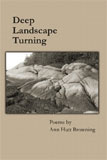April 20, 2013DEEP LANDSCAPE TURNING
Review by Katie Eberhart
Ibbetson Press
25 School Street
Somerville, MA 02143
ISBN: 978-0-578-03232-0
2009, 60 pp., $14.95
www.ibbetsonpress.com
Even on a second—and third—reading of Deep Landscape Turning, I am sucked into Ann Hutt Browning’s vision, and can enjoy another romp through poems of youth and death, love and politics, travel, and a daughter chronicling her flawed father (“Unlearn as soon as you can, please,/ The strident tones of your father …”). I see disintegrated family relations in the letter (a poem) from an English aunt: “Sad news, my dear,/ But not unexpected./ Your father died/ Last Tuesday afternoon …” but then also a closeness between husband and wife. In “Soliloquy And Near-Soliloquy,” the husband speaks alone on the porch:
Death has moved in next door,
Taken up residence amidst the old of that place;
He sits in the easy chair in the front room and waits.
He went there first and that was only fair …
His wife’s voice then comes from the bedroom:
Soon I shall be going.
I have not found a way
To prepare for this journey …
I am not a fan of maudlin love poems and have mixed reactions to poems of death, but the voice of reticence, naiveté, and honesty appeals to me.
Browning wrote as one who lived a long, broad, and caring life. The book is divided in five sections with the poems organized between themes of journeys and families—both her own and others. Browning takes a long, wise-woman view of herself in nature, of writing and living each day, and of separation.
We all go through life anchored by our childhood. Browning’s mother and brother picking tomatoes (“My Younger Brother”) is a happy moment (“He and our mother strolled in the garden/ … He filled her skirt with ripe tomatoes,/ laughing as he dropped each one/ Into the billowing cloth …”) before encountering the complexity of adult turmoil, as in “Custody,” where she, the older sister, must answer the questions of a judge:
“My father is not a responsible man,” I told the judge.
“He only cares about himself, I know that well.
He doesn’t care enough to be a father.”
Browning’s poems show the poet’s integrity. Besides writing of family, Browning travels to faraway places like the Treskavic Monastery in Macedonia and the Jewish Cemetery in Prague. She voices despair in “Milagros: Sacred Charms At a Mexican Shrine in Chicago”:
surprised
I stand among the stubble
unwhole, cut, nevertheless it is I
who surveys the broken fieldsourselves
we cannot decide for ourselves
when overripe grain is to be cut
each day when the grain is cutlegs guts eyes breasts
are cut as well …
This poem engulfs suffering, both broadly and with a personal agony:
swept up
into the harvest wagon
my diseased breast, full flesh, was caught up
tossed into its destiny …
Browning leaves us with a piece of her soul. What she saw and experienced—and the poet’s voice—makes those places seem extraordinary. But then I live a fairly rooted and middle class existence, the sort described in “An Ordinary Life”:
When she awoke in the morning
She threw back her all-cotton sheet,
Cotton woven in a far off country
By a dark-skinned girl chained to her large loom.
When she went into her kitchen
She ground beans to brew her coffee,
Beans grown, roasted in a far off country …
I am horrified by this imagery and certain it is true, having read the articles and seen big retailers distance themselves from overseas factory tragedies. Even an article in The Economist begins:
It is a grimly familiar story: crowded production lines, an electrical short-circuit, flammable chemicals, faulty fire extinguishers, stairways blocked by piles of clothes, exits barred, workers—mostly female—trapped, asphyxiated, burned, or forced to jump to their deaths. The hellish blaze in the Tazreen garment factory on 25th November shocked Bangladesh, but it did not surprise.
Browning brought to her poems earnest observation, empathy, conscience, and the courage to speak up.
Deep Landscape Turning is Ann Hut Browning’s first and last book. She passed away January 15, 2011, so it seems “Soliloquy And Near Soliloquy” was more than rhetorical. From her obituary, I learned Browning was born in England in 1935, and in 1940 her mother brought Ann and her younger brother to America to escape the bombing of London. Ann Hutt Browning had a long and varied career, and was married for 50 years. She clearly lived her life fully and mindfully. In the titular poem at the end of the book, the poet is in Macedonia experiencing and experimenting with separation, and I realize that indeed I’ve been fooled, that this book is actually a collection of love poems—not maudlin but poignant—and I’m certain Ann Hutt Browning is missed by all of her family and friends.
__________
Katie Eberhart‘s poems and essays have appeared in Cirque Journal, SAND JOURNAL, and other places. Eberhart has an MFA in creative writing and degrees in geography and economics. She currently lives in Central Oregon where she blogs about nature and literature. (solsticelight.
wordpress.com)